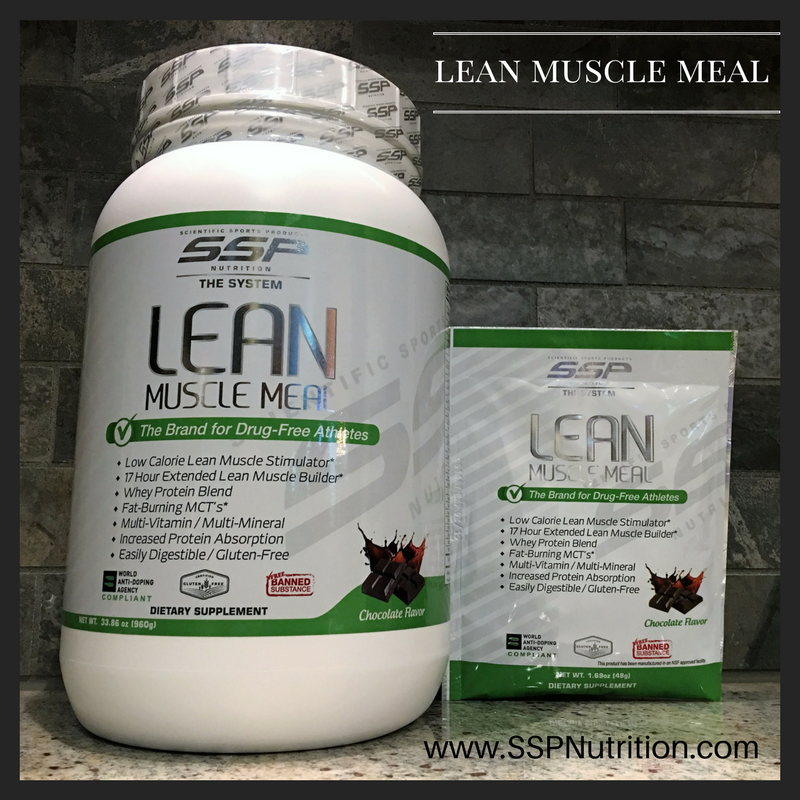
Why Casein Is One of The Best Proteins You Can Take
The below informative information is by Rudy Mawer, MSc, CISSN https://authoritynutrition.com/casein-protein-is-h... as published in: authoritynutrition.com
Why Casein Is One of The Best Proteins You Can Take
Casein is a slow-digesting dairy protein that people often take as a supplement. It releases amino acids slowly, so people often take it before bed to help with recovery and reduce muscle breakdown while they sleep.
Several studies have shown it helps boost muscle growth, along with a ton of other benefits.
 SSP Lean Muscle Meal, containing Whey Protein and Micellar Casein Protein.
SSP Lean Muscle Meal, containing Whey Protein and Micellar Casein Protein.
Like Whey, Casein Is Derived From Milk. Milk contains two types of proteins — casein and whey. Casein is 80% of the milk protein, while whey is 20%. Casein protein is digested slowly, while whey protein digested quickly. This is an important difference between these two popular dairy proteins. Like other animal proteins, casein is a complete protein source. That means it provides all the essential amino acids your body needs for growth and repair (1).
It also contains various unique proteins and bioactive compounds, some of which have health benefits (2, 3).
There are two main forms:
Micellar casein: This is the most popular form and is digested slowly.
Casein Hydrolysate: This form is predigested and rapidly absorbed.
A 33-gram (1.16-ounce) scoop of standard casein protein powder contains 24 grams of protein, 3 grams of carbs and 1 gram of fat (4). It may also contain various micronutrients (such as calcium), but the exact composition will vary depending on the brand.
Casein Takes Much Longer to Digest Than Whey. Casein is well known as a “time-release” protein because of its slow absorption rate in the gut. This means that it feeds your cells with amino acids at a low level over a long period of time. It can help your cells synthesize protein, even during times when your body might normally be breaking down its own muscles to feed itself, such as when you haven’t eaten for some time (5, 6). For this reason, it’s called “anti-catabolic” and helps reduce muscle breakdown (7). One study tested digestion speed by providing participants with either a casein or whey protein shake. Researchers monitored the blood amino acid content, specifically the key amino acid leucine, for seven hours after ingestion (8).
As you can see below, they found a quicker and larger spike from whey protein due to its rapid absorption rate. Despite a smaller initial peak, casein levels stayed more consistent over time.

In another study, researchers gave participants either whey or casein protein and then measured their digestion rate by analyzing circulating levels of the amino acid, leucine, over a seven-hour period. They found that circulating levels of leucine rose 25% higher in the whey protein group, indicating faster digestion (8). This means that the casein group reduced the total amount of protein burned for fuel over a seven-hour period. That means an improved net protein balance, a key factor for muscle growth and retention (9).
Bottom Line: This protein is anti-catabolic. It reduces protein breakdown within the body due to its slow digestion rate and sustained supply of amino acids to muscle cells.
Casein Protein Is Very Effective for Muscle Growth. Bodybuilders and athletes have used this supplement for decades. Like other animal proteins, it contains all the essential amino acids that your own body is unable to produce naturally. Most importantly, it provides a high amount of leucine, which initiates muscle protein synthesis (9, 10, 11).
If you only consume a low or moderate amount of protein, it may help you boost muscle growth simply by increasing your protein intake (12). One study compared those who took casein to two other groups. One consumed whey protein and the other had no protein. The researchers found that the casein group experienced double the muscle growth and triple the fat loss compared to the placebo group. The casein group also experienced more fat loss than the whey group (13). It may also enhance long-term muscle mass by reducing protein breakdown. This process occurs on a daily basis when your body is low on energy and amino acids. It’s accelerated during exercise or weight loss (7, 8, 14).
For this reason, casein is often used at night to prevent the protein breakdown that may occur, since you go through a relatively long period without food while you sleep. In one study, a casein protein shake before bedtime helped strength-training men increase type 2 muscle fiber size by 8.4 cm2 in the supplement group, compared to 4.8 cm2 in the training-only group (15). They also found the casein group increased strength to a greater extent, or about 20% more than the training-only group.
Bottom Line: Much like whey, casein has been repeatedly shown to increase muscle growth and strength when combined with resistance training. It may also help with fat loss.
Casein May Have Other Impressive Benefits for Your Health. Some preliminary studies have found that casein can have other impressive benefits, including:
- Antibacterial and immune benefits: Some cell studies suggest it may provide antibacterial and immune benefits and reduce high blood pressure (2, 16).
- Triglyceride levels: One study in 10 overweight individuals found that it reduced triglyceride levels after a meal by 22% (17).
- Reduction in free radicals: Some of the peptides in casein protein powder may have antioxidant effects and fight the buildup of harmful free radicals (2, 18, 19).
- Fat loss: One 12-week training study found the average fat loss among people taking the supplement was three times greater than in a placebo group (13).
Bottom Line: Although more human studies are needed, initial research shows casein may improve aspects of health, such as lowering triglycerides and helping with weight loss.
Does It Have Any Harmful Side Effects? The myth that high protein intake causes ill health has been debunked many times. Direct studies and reviews have highlighted that there are no negative effects in healthy individuals. The only exception is those with current kidney or liver disease, who may need to limit their protein intake (20, 21, 22). If you take 1-2 scoops of casein per day, then it is highly unlikely that you will get any noticeable side effects, let alone serious ones.
That being said, some people are allergic to casein or intolerant to lactose, which is often found in small amounts with the supplement. Other people may become bloated or experience other digestive symptoms, but this depends on the individual. Like whey, casein protein is very safe for human consumption. As discussed above, it may even have some impressive long-term benefits for your health.
Bottom Line: Like most sources of protein, it is safe for regular consumption and may even provide long-term health benefits. Casein protein has many uses and can be used daily to increase your total protein intake. It may be best to take it before bed, or if you are going for long periods without food.
Take Home Message
Casein is a slow-digesting protein that can boost muscle growth and aid recovery after exercise. Taking it can improve your health, as well as increase your total daily protein intake. This is an important factor in weight loss and muscle growth. Try taking 1–2 scoops of casein protein powder or a large glass of milk before bedtime to improve recovery and reduce protein breakdown. At the end of the day, casein is a highly underrated source of quality protein. You won’t be disappointed if you try it.
You can find the complete article by Rudy Mawer, MSc, CISSN here: https://authoritynutrition.com/casein-protein-is-h...
